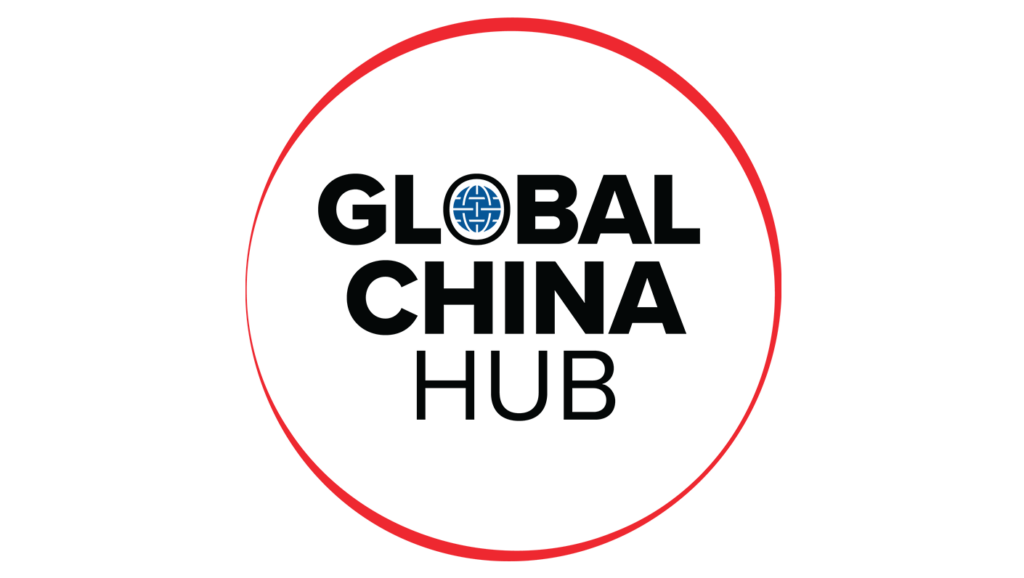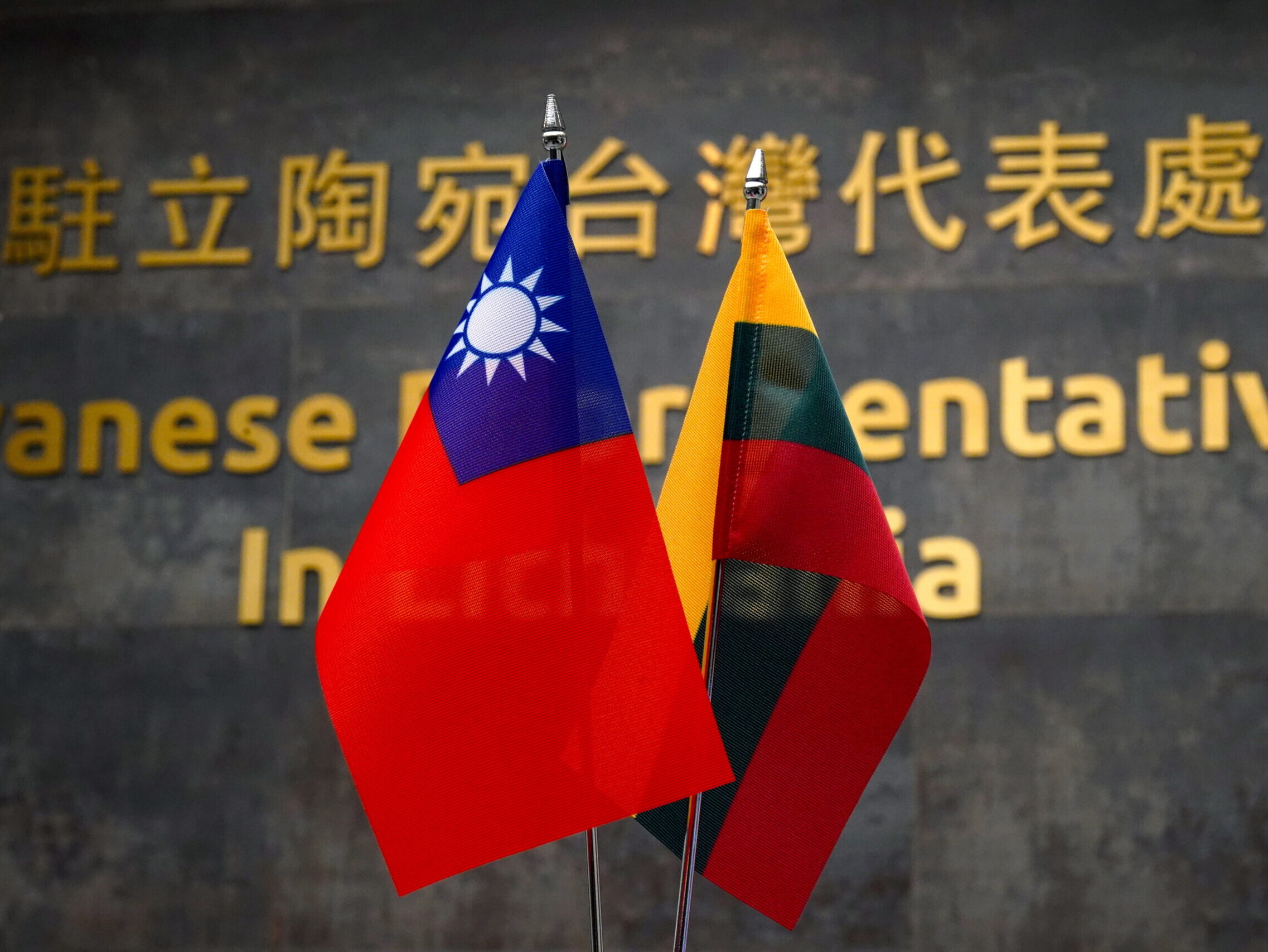November 10, 2025 • 10:00 am ET
Lithuania’s policy on China: An unlikely EU trailblazer
This is the tenth chapter of the report “Is Europe waking up to the China challenge? How geopolitics are reshaping EU and transatlantic strategy.” Read the full report here.
Lithuania, though a small EU member state, has played an outsized role in shaping the European Union’s (EU) approach to China. Over the past three decades, its relations with Beijing have shifted dramatically—from early economic engagement to growing skepticism toward Chinese involvement in Europe, as exemplified by the “16+1” format and the Belt and Road Initiative (BRI). This growing alienation culminated in a diplomatic confrontation in 2021, sparked by Vilnius’s decision to let Taiwan open a representative office in the country. China’s retaliatory economic coercion reverberated across Europe, galvanizing the EU to confront Beijing more directly and reassess its China policy.
Today, Lithuania ranks among the most China-skeptical EU member states, viewing Beijing as a systemic rival and aligning with the US administration and Brussels in resisting its political influence and economic pressure. By standing firm in its partnership with Taiwan amid a broad Chinese intimidation campaign, Vilnius has not only safeguarded its sovereignty but also catalyzed a broader EU policy shift on China—turning its stance into a test of European resilience. In doing so, Lithuania drew on its experience countering another great power, Russia, from which it gradually disentangled itself after the collapse of the Soviet Union and again following Moscow’s annexation of Crimea in 2014. This enabled Vilnius to manage China’s coercion and deepen ties with like-minded partners in the Indo-Pacific, such as Japan and Australia.
Trade and investment: Vilnius sounds the alarm
Established in 1991, relations between Vilnius and Beijing were pragmatic, centered on trade and cultural exchange. In the early 2000s, Lithuania’s trade with China was negligible and imbalanced, with exports of $2 million versus $120 million in imports. As China’s presence in Europe grew and Lithuania integrated into EU supply chains, bilateral trade increased by 533 percent, from $122 million in 2001 to $760 million in 2023 (see Figure 1). In the aftermath of the 2008 global financial crisis, Lithuania viewed China as potential source of growth and investment, leading it to join the “16+1” initiative in 2012, a cooperation platform established by China that brought together Chinese Premier Wen Jiabao and leaders from sixteen Central and Eastern European (CEE) countries. Functioning also as a regional extension of Beijing’s Belt and Road Initiative (BRI), the “16+1” format allowed China to engage with CEE states outside the formal structures of the EU—a strategy that raised concerns in Brussels but was welcomed by participating governments as a potential avenue for economic opportunity.
Yet trade relations revealed persistent asymmetry. Between 2012 and 2024, China’s trade with CEE states grew from $64 billion to $167 billion, but deficits widened from $46 billion to $135 billion. The bulk of trade was concentrated in Poland, the Czech Republic, and Hungary, accounting collectively for nearly 70 percent of total exchanges—$113 billion in 2024. Lithuania’s share remained marginal, at $2.26 billion in 2024 (1.35 percent of total trade), with a $1.82 billion trade deficit. Similarly, Chinese foreign direct investment (FDI) in Lithuania remained minimal, totaling less than $100 million since the early 2000s. The promised benefits of the “16+1” format—and later the “17+1” format, after Greece joined in 2019—never materialized. Instead, Vilnius increasingly viewed the platform as a vehicle for Chinese influence and a means to fragment EU unity.
In May 2021, Lithuania became the first EU member to withdraw from the “17+1” platform on the grounds of limited economic benefits and mounting political concerns. Vilnius called the initiative “divisive” and advocated for a “27+1” approach, in which all EU members engage with China collectively. The decision coincided with the European Parliament’s vote to freeze ratification on the EU-China Comprehensive Agreement on Investment. Later that year, in November 2021, the opening of a Taiwanese representative office in Vilnius—the first in Europe to use “Taiwanese” rather than “Taipei” in its name—triggered a major diplomatic rupture. Beijing interpreted the decision as a direct offence, recalled its ambassador, and pressured Lithuania to do the same, although Vilnius and the EU emphasized that the step did not violate the “One China” policy. In December 2021, all Lithuanian embassy staff left Beijing after their diplomatic status was revoked—a move that many media outlets described as an “evacuation,” raising concerns over possible violations of both the Vienna Convention and Lithuanian law.
In addition, Beijing retaliated with informal trade restrictions, blocking Lithuanian goods, halting freight trains, and targeting EU supply chains that included Lithuanian components. Although Lithuania’s direct exposure was limited—less than 1 percent of its exports and 4 percent of its imports—Beijing’s coercion had broader implications. It demonstrated how China can weaponize even modest economic ties for political leverage and exposed vulnerabilities across the EU, fueling debates about economic security. In response, Brussels launched a World Trade Organization (WTO) case and advanced the Anti-Coercion Instrument (ACI) to deter politically motivated trade measures, signaling a more assertive EU stance in defending sovereignty and reinforcing credibility. The ACI entered into force in December 2023 but has not yet been used.
The United States stepped in, expressing strong support for Lithuania in the face of political pressure and economic coercion from China, extending a $600 million export credit through the US Export-Import Bank to boost trade in high-tech, services, and renewable energy. Transatlantic solidarity was reinforced in a joint-statement by thirteen foreign affairs committee chairs from eleven European legislatures, backed by the US Senate, condemning China’s pressure. The Biden administration also dispatched a special eight-person State Department team, informally known as “the firm,” to help Lithuania diversify markets and mitigate supply chain disruptions. These efforts enabled Lithuania to reorient its trade, with exports to the Indo-Pacific rising 60 percent in early 2022—effectively quadrupling the value of its former exports to China.
The crisis also marked Lithuania’s exit from China’s BRI, with rail services discontinued and proposals regarding Chinese investment into the Klaipėda port rejected by Lithuanian leaders on security grounds. Ultimately, Lithuania’s experience highlighted the risks of dependency and underscored a broader European shift: from viewing China as an economic partner to framing it as a systemic rival, testing the EU’s unity and resilience.
Technology: Phasing out Huawei
In 2018, Lithuania aligned with security concerns raised by the first Trump administration and restricted Huawei’s involvement in its 5G network development, especially in militarily sensitive installations, becoming one of the first EU member states to heed US warnings. This stance was formalized in September 2020 through a memorandum of understanding with the United States on secure 5G network development, after which Vilnius began phasing out Huawei equipment as a matter of national security and allied sovereignty. This positioned Lithuania as a frontrunner within the EU in taking concrete policy measures and implementing restrictions on Chinese technology. In late 2020, Telia Lietuva, the country’s largest telecom operator, announced it would replace Huawei 4G equipment with Ericsson equipment for its 5G rollout. Huawei was also excluded from military-sensitive infrastructure. By July 2025, the company’s market share in Lithuania had fallen to just 2.47 percent of the mobile vendor market—exceptionally low compared with its share in other European countries.
Security: Beijing and Moscow are testing Baltic resolve
Lithuania’s security relationship with China has been marked by mistrust, shaped by Vilnius’s alignment with the West and particularly US security concerns over Beijing’s assertive behavior. In 2019, Lithuania became one of the first states to identify China as a national security threat in its National Threat Assessment, citing espionage and political interference alongside risks tied to technological dependence. The assessment highlighted that these risks extended beyond traditional issues such as Taiwan and human rights and included Chinese interference in Lithuania’s political landscape. That same year, Vilnius also embraced the EU’s framing of China as a “systemic rival.”
These concerns led to a series of restrictive measures bridging national and economic security: excluding Huawei and other Chinese firms from 5G networks, tightening scrutiny of Chinese investment in critical infrastructure, and banning Chinese remote access to renewable energy systems. Lithuania had already adopted its own FDI screening mechanism in 2018, two years before an EU framework was introduced. In 2024, the legislation was expanded to include cybersecurity. Today, Lithuania’s regulatory framework remains among the strictest in Europe, prioritizing national security alongside commercial considerations and reflecting Vilnius’s acute sensitivity to external influence and geopolitical vulnerabilities.
On this basis, Lithuania withdrew from the “17+1” initiative in 2021 and co-signed, with thirteen other countries, a joint EU statement criticizing China’s conduct during the COVID-19 pandemic, questioning the transparency of the World Health Organization’s investigation into the origins of the virus. Vilnius also supported Taiwan’s observer status at the World Health Assembly—and the Lithuanian parliament adopted a resolution condemning China for the genocide against Uyghur Muslims in Xinjiang. Beijing retaliated with trade restrictions, including suspending Lithuanian wheat imports. That same year, the government authorized the opening of a Taiwanese representative office in Vilnius, prompting sweeping Chinese coercion and further embedding Lithuania’s security-driven, values-based foreign policy within a transatlantic framework.
Russia’s 2022 full-scale invasion of Ukraine deepened these concerns, as Vilnius viewed the Sino-Russian “no limits” partnership as tacit support for Moscow’s aggression and a direct threat to NATO’s eastern flank. Lithuania increasingly framed China as an enabler of Russian aggression, underscoring the need for coordinated transatlantic policies. Beijing, in turn, depicted Lithuania as a US puppet and “the most anti-Russia country in Europe,” rhetoric used to justify countermeasures. Tensions escalated further in April 2023 when China’s ambassador to France questioned the sovereignty of the Baltic states, claiming that countries which emerged after the Soviet Union’s collapse “do not have effective status under international law,” provoking strong EU backlash.
Within the broader US-China strategic rivalry, Lithuania has firmly aligned with the United States, reinforcing its credibility within NATO and the EU while leveraging the dispute to deepen cooperation with the US administration on economic security. Importantly, Lithuania’s tougher stance on China predates the center-right government of former Prime Minister Ingrida Šimonytė (2020-2024). In fact, the initial shift toward a more defiant posture began in 2013 when President Dalia Grybauskaitė met with the Dalai Lama, prompting punitive actions from Beijing, and continued under Saulius Skvernelis’s center-left government (2016-2020). Today, Prime Minister Gintautas Paluckas signals cautious diplomacy with China while maintaining firm commitments to security and democratic standards.
Lithuania’s alignment with the EU’s China policy
Lithuania aligns closely with both the EU and the United States in framing China as a “systemic rival” and a “coercive power.” Standing firm on Taiwan and refusing to yield to economic pressure, it has emerged as a leading voice for a tougher and more coordinated China approach—and as a frontrunner in shaping the EU’s collective response, pushing for de-risking measures and the adoption of anti-coercion legislation. Its confrontation with China not only strengthened ties with the United States, where its principled stance drew political and economic support, but also reverberated across the EU. Beijing’s coercion against Lithuania exposed vulnerabilities even among member states with minimal ties to China, accelerating Brussels’ shift toward de-risking, supply chain diversification, and greater collective resilience.
The Lithuanian case became a test of EU unity at a pivotal moment for European security. Brussels condemned Beijing’s sanctions, backed Vilnius through WTO proceedings, and fast-tracked the adoption of the ACI—an instrument that had already been in development during the first Trump administration—sending a clear signal that no member state, however small, would face external pressure alone and reinforcing the EU’s credibility as a collective geopolitical actor.
Although relations with Beijing remain strained, Vilnius continues to champion Taiwan’s international participation and to push EU initiatives on economic security. For Lithuania, its China policy is now defined less by trade considerations and more by the imperatives of European unity and transatlantic coordination. What began as a bilateral dispute has evolved into a catalyst for stronger EU cohesion, turning Lithuania from an outlier into a trailblazer in Europe’s evolving approach to China.
Conclusion
Lithuania’s case provides a litmus test of whether a small liberal democracy can withstand Chinese economic coercion, with its dispute with Beijing reverberating throughout the EU-China relationship. By elevating the Taiwan issue and pushing Beijing higher on the EU agenda, Vilnius has accelerated Brussels’ shift from a trade-centered engagement to a more defensive posture, including the adoption of new anti-coercion instruments. Its experience reflects broader European concerns over dependence on China—from Huawei involvement to BRI projects to Chinese investment—and has prompted a wider reassessment of China as a systemic rival. In the process, Lithuania has positioned itself as both an early adopter of US security priorities and a policy influencer within the EU, amplifying transatlantic coordination at moments when larger member states hesitated.
As one of the EU’s most uncompromising voices on China, Vilnius has framed the challenge from Beijing alongside the threat from Moscow, presenting both as pillars of an authoritarian bloc. Lithuania’s alignment with the United States and the broader transatlantic community draws on its historical experience with authoritarian coercion and its acute sense of vulnerability. Politically, Vilnius casts itself as a values-driven actor. While the United States identifies China as its top security adversary, and Brussels seeks a more calibrated balance, Lithuania has helped bridge the gap by advancing US priorities within the EU, serving simultaneously as a driver of transatlantic coordination and as a moral compass in Europe’s evolving China debate.
About the authors
Related Content
Explore the programs

The Global China Hub tracks Beijing’s actions and their global impacts, assessing China’s rise from multiple angles and identifying emerging China policy challenges. The Hub leverages its network of China experts around the world to generate actionable recommendations for policymakers in Washington and beyond.

The Europe Center promotes leadership, strategies, and analysis to ensure a strong, ambitious, and forward-looking transatlantic relationship.
Image: Taiwanese and Lithuanian flags are displayed at the Taiwanese Representative Office in Vilnius, Lithuania January 20, 2022. REUTERS/Janis Laizans









